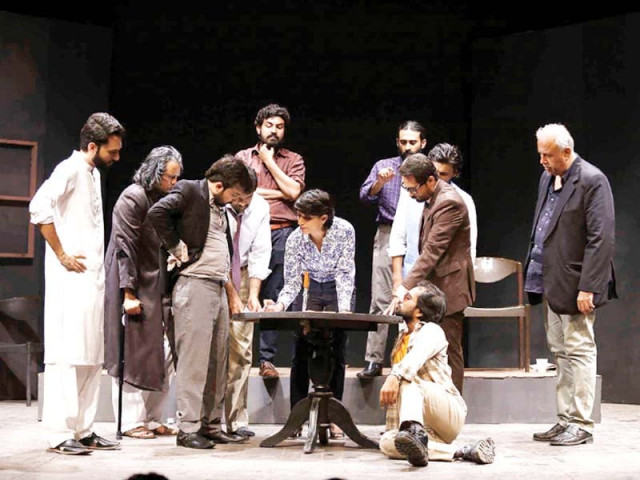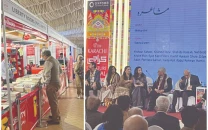Sunil Shankar's 'Qusoorwaar’ makes strong case for itself
Adapted from Hollywood classic ‘12 Angry Men,’ gripping courtroom drama kept audience on edge of their seats

Qusoorwaar stars Fawad Khan, Mesum Naqvi, Saad Fareedi, Ali Junejo, Nazarul Hasan, Ali Rizvi, Rauf Afridi, Osama Tahir, Naveed, Joshinder Chaggar and Sunil Shankar. PHOTO: PUBLICITY
Adapting such classics in Pakistan has always been risky. Although quite common, rarely has the outcome ever turned out to be a wholesome experience for the audience. However, local actor and play director Sunil Shankar has proved otherwise with Qusoorwaar, making it both original and impactful. Going in, we were rather curious to see how Shankar would adjust the play’s content to cater to the Pakistani audience. After all, the 90-minute drama is set in one claustrophobic room on the hottest day of the summer, where 12 jurors decide whether to send a boy on trial for his father’s murder, to death row.
Granted, theatre has different nuances as compared to film, but the courtroom drama does not attempt to entertain you. Rather, Qusoorwaar draws you in with its intense dialogues and then, keeps you glued to your seat.
This is where the director’s mastery steps in. It takes a lot of chutzpah to make a drama as powerful, as well as entertaining while retaining its essence. Wusatullah Khan’s dialogues are taut and never let the audience take a breather – not once.
In an interesting divergence from the film, 12 angry men become 11 angry men and a woman who tries to persuade them of a reasonable doubt in their judgment. A strong cast of Fawad Khan, Mesum Naqvi, Saad Fareedi, Ali Junejo, Nazarul Hasan, Ali Rizvi, Rauf Afridi, Osama Tahir, Naveed, Joshinder Chaggar and Shankar himself play the jurors. Shankar also infuses a more comedic angle by adding cuss words and Afridi’s hilarious character to the play, attempting to keep the entertainment-hungry audience well-fed. While the cussing did not sit well with the families in attendance, the words were not anything we have not heard or used before, therefore making it more relevant to our society, albeit uncomfortably.
The performances clearly elevated the play, as an audience member commented, “One essentially forgot they were in a theatre watching a work of fiction”. Fareedi, Khan and Hasan delivered impeccably nuanced performances, showing a detailed understanding of their characters.
However, as hard it is to fill in Henry Fonda’s shoes, Chaggar’s dialogues did not have as much impact as they should, on account of her mellow intonation. However, what matters is that the play delivered on almost all important beats and captivated the audience like none other has during the Karachi Theater Festival.
After the plays, an interactive session between the cast and audience is held, although most of the audience-members usually leave early. The success of Qusoorwaar is evident in how not a single person moved after the play ended and actively interacted with the cast, showering praises.
While the teleplay has been adapted numerous times, with Qusoorwaar, Shankar set a precedent on how adaptations ought to be done. It would be fair to say that Shankar and his team made Rose and Lumet proud.
Published in The Express Tribune, November 18th, 2016.
Like Life & Style on Facebook, follow @ETLifeandStyle on Twitter for the latest in fashion, gossip and entertainment.



















COMMENTS
Comments are moderated and generally will be posted if they are on-topic and not abusive.
For more information, please see our Comments FAQ